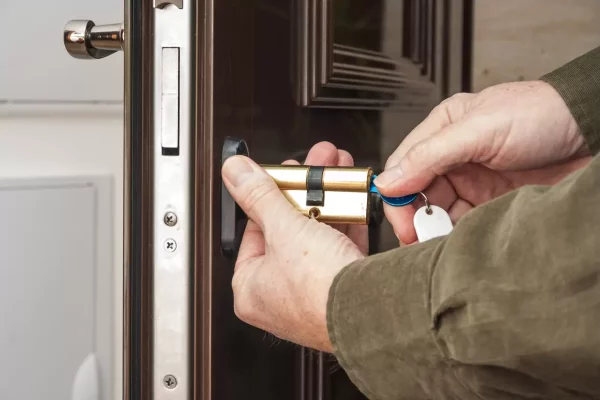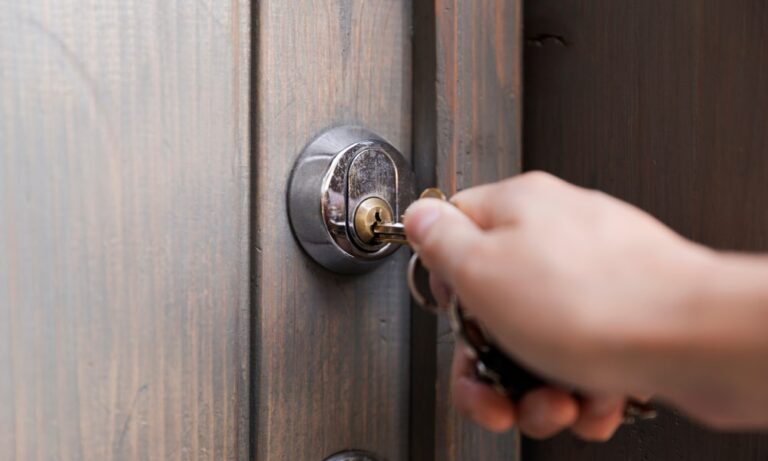Expert Solutions for When Your Key is Stuck in the Lock

Picture this: you’re trying to unlock a door, and suddenly, you realize that the key is stuck in the lock. This situation can be incredibly frustrating and inconvenient, and it happens more often than you might think. At our professional locksmith service located in Salem, OR, we deal with such cases on a regular basis. We’re here to provide swift and expert solutions to you should you find your keys stuck in a lock.
When you’re facing this issue, it’s essential to have reliable information on how to deal with it effectively. The process of extracting a stuck key can be intricate, requiring specific knowledge and tools to avoid damaging the lock mechanism. In this article, we’ll share some expert advice and proven solutions that can assist you when your key is lodged in the lock, ensuring you can resolve the situation with minimal hassle.
We aim to offer insights that are simple, clear, and easy to follow, allowing you to handle a key stuck in a lock scenario confidently or to make an informed decision when seeking professional assistance. Read on to explore various effective approaches and tips to address this common problem and to gain peace of mind by knowing how to approach it the next time it occurs.
Identifying the Cause: Why Keys Get Stuck in Locks
Understanding why keys get stuck in locks is the initial step in addressing the issue effectively. There are several reasons why this common problem occurs, and being aware of them can help you prevent it in the future or deal with it more efficiently when it happens. When a key is lodged firmly in a lock, reaching out to a professional locksmith for stuck key situations is often the safest and most reliable option, ensuring that neither the key nor the lock suffer damage during the extraction process.
1. Wear and Tear:
The frequent use of keys and locks leads to their gradual wear and tear. Over time, small bits of metal can break off from the key, or the internal mechanism of the lock can degrade, creating obstructions that can trap the key. Regular maintenance of both keys and locks can help reduce the wear and, thus, the chances of a key getting stuck.
2. Dirt and Debris:
Dirt, grime, and other foreign particles can accumulate inside the lock over time, causing the key to get jammed. Cleaning the lock periodically and avoiding the use of keys can help prevent such situations.
3. Incorrect Key:
Sometimes, using the wrong key can cause it to get stuck. It is crucial to double-check the key before inserting it into the lock to avoid forcing an incorrect one, which can lead to more complications.
4. Poorly Cut Keys:
Keys that are poorly cut or incorrectly made can easily become stuck in locks. Ensure that you get your keys cut by professional and reputable services to avoid inaccuracies that can lead to such problems.
5. Faulty Lock Mechanism:
A malfunction within the lock itself, perhaps due to a manufacturing defect or internal damage, can also be a culprit. Regular inspections by a locksmith can identify and rectify such issues before they result in a stuck-key scenario.
6. Cold Weather:
In extremely cold weather, the interior of the lock can freeze, causing the key to get stuck. Using a lock de-icer or a heated key can remedy this situation effectively.
7. Rust and Corrosion:
Exposure to moisture can lead to rust and corrosion inside the lock, making it difficult to turn the key. Using graphite lubricants can keep the lock mechanism smooth and rust-free.
When faced with a key stuck in a lock, trying to force it out can cause more damage. In such cases, contacting a locksmith for stuck-key situations is the optimal solution. They possess the right tools and knowledge to address the issue promptly and effectively, mitigating the risk of damage to the lock or key.
Being well-informed about the causes of stuck keys can empower you to take proactive measures in maintaining your locks and keys and make more informed decisions when seeking professional help, ultimately ensuring the security and functionality of your locks for the long term.

Step-by-Step Guide: How to Safely Remove a Stuck Key
Encountering a stuck key can be stressful, but knowing how to safely remove it can make the experience less daunting. While locksmith services for key extraction are often the safest route to ensure no further damage occurs, there are some steps you can try yourself before calling in the professionals.
1. Stay Calm and Don’t Force It:
When you find your key stuck in the lock, it’s crucial to remain calm. Avoid applying excessive force, as it might break the key inside the lock, complicating the situation further.
2. Lubricate the Lock:
Apply a lock lubricant, like graphite spray or silicone-based lubricant, to the keyhole. Give it a moment to seep into the lock mechanism. This can sometimes make it easier to remove the key.
3. Gently Wiggle the Key:
After lubricating, gently wiggle the key back and forth (not up and down) to see if it will come out. Exercise patience and caution during this step to avoid breaking the key.
4. Push the Plug:
If the key is still stuck, try pushing the plug (the circular piece where you insert the key) with a finger while gently pulling the key out. This action might align the pins inside the lock and allow the key to be removed.
5. Use Pliers:
If the key remains stuck, using needle-nose pliers can help you get a better grip on the key. Grasp the key gently and try pulling it out slowly, avoiding any sudden movements.
If after all these attempts, the key still won’t budge, it’s time to call in the experts. Reaching out to locksmith services for key extraction is advisable to handle complex situations and avoid causing more damage to the lock or breaking the key. Professional locksmiths in Salem, OR, have the knowledge, experience, and tools necessary to address this issue promptly and efficiently.
Having a reliable locksmith service contact is beneficial for dealing with such emergencies swiftly. They can also provide insights and suggestions on maintaining your locks in optimum condition, preventing similar issues in the future. This step-by-step guide is meant to assist you in safely removing a stuck key without causing damage, but when in doubt, always opt for professional help to ensure the security and longevity of your locks and keys.
Remember, every lock and key is different, and what works for one may not work for another. Evaluating the situation accurately and deciding whether to try removing the key yourself or calling for professional help is crucial in resolving the key stuck in lock problem effectively and safely.
Preventive Measures: Avoiding Future Key and Lock Issues
After dealing with a stuck key, it’s natural to want to avoid similar issues in the future. By implementing some preventive measures and being mindful of how you use your keys and locks, you can significantly reduce the likelihood of facing such problems.
1. Regular Maintenance:
Frequently clean and lubricate your locks to ensure they work smoothly. A well-maintained lock is less likely to jam or cause issues with the key. Use graphite lubricants for the best results, and avoid oil-based products as they can attract dirt and debris.
2. Use Quality Keys:
Always get your keys cut by reputable and professional services to ensure accuracy and quality. Poorly cut or worn-out keys are more prone to getting stuck or causing damage to the lock.
3. Avoid Excessive Force:
Using too much force when turning the key can lead to a higher risk of it getting stuck or even breaking inside the lock. Turn the key gently, and avoid forcing it if it doesn’t turn easily.
4. Keep Keys Clean:
Ensure your keys are free from dirt and grime, as dirty keys can transfer debris to the lock, affecting its functionality. Clean your keys regularly with a mild cleaner and a soft cloth.
5. Address Issues Promptly:
If you notice any issues with your key or lock, such as difficulty turning the key or a loose lock, address them immediately. Early intervention can prevent more significant problems and potential lockouts.
6. Install Quality Locks:
Choose high-quality locks for your doors. Quality locks are typically more durable and resistant to wear and tear, providing better security and reducing the chances of keys getting stuck.
7. Weather Protection:
Protect your locks from extreme weather conditions, especially in areas with harsh winters, by using protective covers. This can prevent freezing and rusting, which can affect the lock mechanism.
8. Carry Spare Keys:
Having a set of spare keys can be a lifesaver if your key gets stuck or lost. Store spare keys in a secure and accessible location, or give a set to a trusted friend or family member.
By adopting these preventive measures, you can ensure the longevity and optimal performance of your locks and keys, providing you with peace of mind and security. It’s always better to be proactive in maintaining your locks and keys to avoid the inconvenience and potential security risks associated with stuck or broken keys. Additionally, staying informed about the proper usage and maintenance of locks and keys can save you from unnecessary hassle and help you handle any lock-related issues with confidence and ease.
Conclusion
It’s crucial to understand the various aspects of dealing with a key stuck in the lock, from understanding the causes to learning about preventive measures. The insights shared in this article aim to guide you through safely removing a stuck key and maintaining your locks and keys in top condition to avoid future issues. At Locksmith Empire, we prioritize empowering our clients with knowledge, ensuring they can make informed decisions in situations involving their locks and keys. Whether you need professional advice or require urgent assistance, the Locksmith Empire company is dedicated to offering expert solutions and top-notch services to meet all your locksmith needs in Salem, OR.
Through acquiring knowledge and staying prepared, you can handle most lock and key issues effectively. However, having a trustworthy locksmith service like Locksmith Empire at your beck and call ensures peace of mind and security in any lock-related situation.
Frequently Asked Questions
Question: What should I do if my key is stuck in the lock?
Answer: Start by not forcing the key. Lubricate the lock, gently wiggle the key, and if unsuccessful, contact a professional locksmith service promptly to avoid damaging the lock or key.
Question: Can a stuck key be due to a faulty lock?
Answer: Yes, a malfunctioning lock mechanism can lead to keys getting stuck. Regular inspections by a professional locksmith can identify and fix such issues.
Question: How can I maintain my lock and avoid keys getting stuck?
Answer: Regular cleaning and lubrication of the lock mechanism, using quality keys, and addressing any lock issues promptly can help maintain the lock and prevent keys from getting stuck.
Question: Is it safe to try and remove the stuck key myself?
Answer: While it’s possible to safely remove a stuck key using gentle methods and lubrication, there’s a risk of causing further damage. If unsure, it’s best to seek professional assistance.
Question: How can extreme weather affect my locks?
Answer: Extreme cold can cause the internal mechanism of locks to freeze, making it difficult to insert or remove keys. Protecting your locks from harsh weather and using de-icers can help in such situations.

